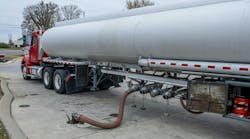Back in the 1990s, Illinois passed regulations requiring trucking fleets that operate 10 or more vehicles within Chicago city limits to run at least 10% of those vehicles on alternative fuel. It was part of an effort to make the air cleaner and as such, the city provided incentives to encourage compliance.
El Milagro, a 64-year-old, family-owned company producing corn and flour tortillas, tostadas, chips and taco shells, immediately saw the benefits. Taking advantage of the incentives, which paid for 80% of the conversion cost, the company began switching its delivery vehicles over to propane autogas at the rate of two to three per year through a third-party converter.
That is, until 2012. That year, El Milagro decided to convert its entire 55-vehicle fleet over to new Isuzu N-Series truck models with Bi-Phase Technologies’ propane autogas conversions, a system that was first tested successfully by Schwan’s Home Service. The trucks feature a 16-ft. van body.
The Bi-Phase system is a dedicated multi-port fuel injection system for engines. Propane is injected in a liquid state, eliminating the need for a vaporizer or regulator. Self-cooling fuel injectors are specially designed for liquid propane. The entire system is designed for bolt-on installation.
El Milagro’s Chicago fleet transports products from its corn and flour manufacturing facilities to small- to medium-sized businesses and grocery stores in the Chicagoland area and north to Milwaukee, WI. The company also has operations in Georgia and Texas, operating about 80 vehicles in all.
To accommodate the propane vehicles, two 800-gal. propane tanks and a dispensing system were installed at one of El Milagro’s facilities.
“A big advantage with propane is we can pump here at our own facility and don’t lose time going out to gas stations,” says Bobby Morales, sales and distribution manager. “The infrastructure was 100% taken care of by our supplier, who installed equipment at the facility at no cost. [The supplier] owns the tanks and pumps and we pay nothing for the equipment. If something breaks down, they come fix it without us spending a dime.”
According to Morales, the fleet’s fuel bills have been cut in half due to the lower cost of propane as well as the government incentives. “We save a lot of money on fuel,” he says. “Propane prices here fluctuate just like gasoline, but they are a little less than half of what gasoline is at any given time. On top of that, the state had a rebate of 50¢ per gallon to use propane [autogas], saving us even more.”
With routes that include frequent stops (some vehicles stop every 5 to 10 minutes), the Isuzu trucks work hard for El Milagro. Covering about 240,000 mi. over five years, each truck has maintenance needs. But the use of propane autogas has resulted in some savings in this area as well, says Morales.
“The plugs in the vehicles and some other parts do last longer [with propane] than with gasoline,” he explains. “We still do the regular maintenance, but you don’t have to replace those parts as often. For instance, you typically have to change plugs every 30,000 mi. [with gasoline], but you can go 60,000 mi. with propane.”
The Windy City’s brutal winter weather has not been an issue either, Morales points out. And he says that the reduced emissions from the new vehicles has resulted in the state of Illinois exempting El Milagro from standard vehicle emissions testing, a further cost savings.
“It is very easy in many cities now—not just Chicago—to fill up publicly if you run out of fuel and just keep going,” says Morales. “Now that propane is being sold in almost every city around us and in the suburbs, it’s one of the main advantages we have and is one more thing we keep in mind as we grow.”



